Upcoming Events
Register for Community Conversations!
Planning for Open Grants: Fostering a Transparent and Accessible National Research Infrastructure, an initiative led by the University of Florida, has undertaken an effort to establish a blueprint for wider dissemination of openly accessible grant proposals and funding guidelines.
Following an advisory committee meeting in 2022, we are excited to broaden the conversation to interested researchers, librarians, archivists, research administrators, and funders through a series of three open community conversations:
What are we so afraid of?
Thursday, October 26th, 2pm Eastern
Register
The PFOG advisory committee has surfaced a variety of potential concerns with grant sharing, including fear of “scooping”; anxiety over unfulfilled project goals, risk of sharing financial information, and potential for targeting by bad actors seeking out research on supposedly objectionable topics. This call will review and prioritize the most pressing fears and concerns and develop a strategy or talking points for addressing each one.
Describing and discovering proposals
Thursday, November 2nd, 11am Eastern
Register
Which descriptive metadata elements are most valuable in finding and understanding grant proposals? How do these complement or enrich basic metadata already available from funders? These questions are critical to moving forward with sharing proposals, whether through a standalone repository or incorporated into other existing repositories. This session will offer an opportunity to discuss the metadata scheme drafted by the project team, and to consider ways to improve or refine these recommendations.
Contributing to the scholarly record
Thursday, November 30th, 1pm Eastern
Register
Much like other “gray literature” (e.g., newsletters, reports), grant proposals are seldom recognized as research objects in and of themselves. This session will consider how researchers and collaborators should get credit for the labor of writing proposals by compiling concrete ways to make this a reality, beyond circulating the proposals online. How would integrations with other repositories or frameworks such as ORCID promote this? Which metadata–about a grant’s project team, references or citations, quality ratings, etc.–could potentially demonstrate the value of a particular proposal, and which may be infeasible or undesirable?
Acknowledgments
This project was made possible in part by the Institute of Museum and Library Services Award # LG-250067-OLS-21.
